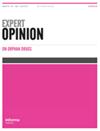Variability in management and outcomes of therapy with eculizumab in atypical hemolytic uremic syndrome
IF 0.8
4区 医学
Q4 PHARMACOLOGY & PHARMACY
引用次数: 0
Abstract
ABSTRACT Objectives: Atypical hemolytic uremic syndrome (aHUS) is a thrombotic microangiopathy caused by complement dysregulation. The aim of this study was to establish the efficacy and safety of eculizumab in patients with aHUS in clinical practice and to describe different individualization strategies. Methods: Authors performed an observational, longitudinal, and ambispective study at a tertiary care center. Clinical histories of patients in treatment with eculizumab were reviewed. Effectiveness and safety were assessed with the evolution of analytical parameters, symptoms and concomitant therapies required. Results: Authors included five patients (two children). The patients were followed up from diagnosis and first administration of eculizumab. Four patients discontinued eculizumab: one because he had anti-factor H autoantibodies that could be managed with immunosuppressive therapy, another because of non-response, and the other two because of clinical stabilization, resolution of TMA, and no findings of high-risk mutations in complement factors. Therapy was tapered in the remaining patients in aHUS remission. No adverse events were identified during or after treatment. Conclusion: Eculizumab is an effective and safe treatment for patients diagnosed with primary or secondary aHUS. Personalized treatment, tapering or discontinuation should be taken on an individual basis by a multidisciplinary team in order to increase the cost-effectiveness of this therapy.异珠单抗治疗非典型溶血性尿毒症综合征的管理和结果的可变性
目的:非典型溶血性尿毒症综合征(aHUS)是一种由补体失调引起的血栓性微血管疾病。本研究的目的是在临床实践中确定eculizumab在aHUS患者中的有效性和安全性,并描述不同的个体化策略。方法:作者在一家三级保健中心进行了一项观察性、纵向和双视角研究。我们回顾了接受eculizumab治疗的患者的临床病史。根据分析参数、症状和所需的伴随治疗的演变评估有效性和安全性。结果:作者纳入5例患者(2例儿童)。患者从诊断和首次给药开始随访。4例患者停用eculizumab: 1例患者有抗因子H自身抗体,可通过免疫抑制治疗,另1例患者无应答,另外2例患者临床稳定,TMA消退,补体因子未发现高危突变。其余aHUS缓解患者的治疗逐渐减少。在治疗期间或治疗后未发现不良事件。结论:Eculizumab对于原发性或继发性aHUS患者是一种有效且安全的治疗方法。个体化治疗,减量或停药应由多学科团队在个体基础上采取,以提高该治疗的成本效益。
本文章由计算机程序翻译,如有差异,请以英文原文为准。
求助全文
约1分钟内获得全文
求助全文
来源期刊

Expert Opinion on Orphan Drugs
PHARMACOLOGY & PHARMACY-
CiteScore
2.30
自引率
0.00%
发文量
8
期刊介绍:
Expert Opinion on Orphan Drugs is an international, peer-reviewed journal that covers all aspects of R&D on rare diseases and orphan drugs.
 求助内容:
求助内容: 应助结果提醒方式:
应助结果提醒方式:


